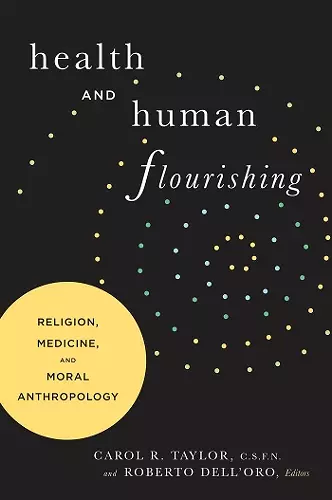Health and Human Flourishing
Religion, Medicine, and Moral Anthropology
Carol R Taylor editor Roberto Dell’Oro editor
Format:Paperback
Publisher:Georgetown University Press
Published:20th Jun '06
Currently unavailable, and unfortunately no date known when it will be back

Those who have lamented the moral minimalism of much conventional bioethics should celebrate this splendid volume. Those who have called for 'a richer bioethics' should delight in it. Its attention to the nature of human nature and of human flourishing provides an antidote to the reduction of morality to universal and minimal principles. Its thoughtful consideration of human vulnerability, integrity, and relationality displays the poverty of an ethic focused on autonomy and points toward a bioethics richer than an emphasis on individual choice can provide. Nurturing a conversation among philosophers, theologians, and health care professionals, the book rejects both 'the view from nowhere' and ideological relativism. Some essays retrieve religious traditions concerning what is at stake in our being sick or in caring for those who are (indeed, more than one attends to scripture!), and others display the public intelligibility of such a richer account using the tools of phenomenology or analysis. The book is enough to give one hope for the future of bioethics. -- Allen Verhey, professor of theological ethics, Duke Divinity School
Provides contributions from a range of disciplines that mine the intersection of the secular and the religious, the medical and the moral, to unearth the ethical and clinical implications. This title includes an examination of how a theological anthropology can help us better understand health care, social policy, and science.What, exactly, does it mean to be human? It is an age-old question, one for which theology, philosophy, science, and medicine have all provided different answers. But though a unified response to the question can no longer be taken for granted, how we answer it frames the wide range of different norms, principles, values, and intuitions that characterize today's bioethical discussions. If we don't know what it means to be human, how can we judge whether biomedical sciences threaten or enhance our humanity? This fundamental question, however, receives little attention in the study of bioethics. In a field consumed with the promises and perils of new medical discoveries, emerging technologies, and unprecedented social change, current conversations about bioethics focus primarily on questions of harm and benefit, patient autonomy, and equality of health care distribution. Prevailing models of medical ethics emphasize human capacity for self-control and self-determination, rarely considering such inescapable dimensions of the human condition as disability, loss, and suffering, community and dignity, all of which make it difficult for us to be truly independent. In "Health and Human Flourishing", contributors from a wide range of disciplines mine the intersection of the secular and the religious, the medical and the moral, to unearth the ethical and clinical implications of these facets of human existence. Their aim is a richer bioethics, one that takes into account the roles of vulnerability, dignity, integrity, and relationality in human affliction as well as human thriving. Including an examination of how a theological anthropology - a theological understanding of what it means to be a human being - can help us better understand health care, social policy, and science, this thought-provoking anthology will inspire much-needed conversation among philosophers, theologians, and health care professionals.
Health and Human Flourishing represents a positive contribution towards validating voices of faith expressed through rational argumentation in the sphere of bioethics. Health Progress The contributors' ability to see the healing professions not only in terms of positive outcomes, but also in the context of our interdependence and mutual frailty suggests that the field of medical ethics is indeed reaching into its full human maturity. America This book is to be praised and indeed read and discussed for its daring attempt to address the anthropological quandry, thereby moving the bioethical debate beyond its usual focus on rights, decision making, and (meta-)ethical theories. Theoretical Medicine and Bioethics Undoubtably relevant beyond the US Catholic milieu. The collection will be helpful, not only to those engaged in medicine or bioethics, but to anyone reflecting on the meaning of human vulnerability, integrity, relationality and flourishing in the light of experiences of illness and healing. The Way
ISBN: 9781589010796
Dimensions: unknown
Weight: 408g
296 pages